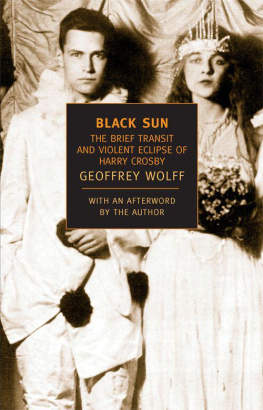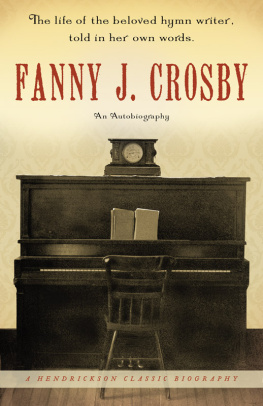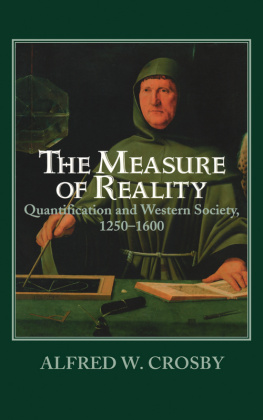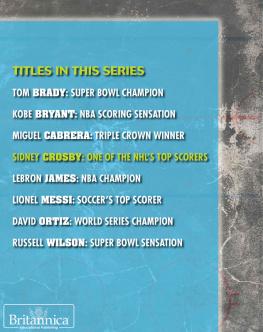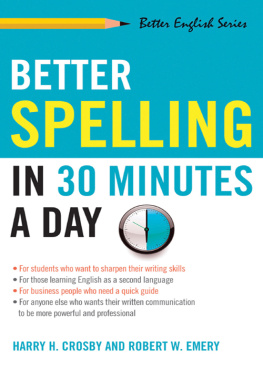GEOFFREY WOLFF is the author of three other works of nonfictionThe Art of Burning Bridges: A Life of John OHara; The Duke of Deception, a memoir; and A Day at the Beach, a collection of personal essaysas well as six novels, most recently The Age of Consent. In 1994 he received the Award in Literature from the American Academy of Arts and Letters. Mr. Wolff is the director of the graduate fiction program at the University of California, Irvine.
BLACK SUN
THE BRIEF TRANSIT AND VIOLENT ECLIPSE OF HARRY CROSBY
GEOFFREY WOLFF
NEW YORK REVIEW BOOKS

New York
T O C HARLES AND N ANCY T APLIN ,
in gratitude and friendship
Life itself is but the shadow of death, and souls departed but the shadows of the living. All things fall under this name. The sun itself is but the dark simulacrum, and light but the shadow of God.
Garden of Cyrus,
Sir Thomas Browne
Contents
Preface
The notes at the back of this book may be consulted for the sources of all quotations not fully attributed and dated within the text. I have reserved for my bibliography a full description of the invaluable resources made available to me by a number of libraries, most notably those of Southern Illinois University and Brown University.
I first read about Harry Crosby fifteen years ago, in Malcolm Cowleys Exiles Return, and the story Cowley told was so striking, its implications so resonant, that I felt certain someone must have written it at length since 1934, when Cowley had finished his few chapters about Crosbys suicide. (He revised them in 1951.) But no one had in fact told Harrys full story, and most of those who had written about him, or about the Black Sun Press, treated him as merely a footnote, and borrowed either from Cowley or from Caresse Crosbys untrustworthy autobiography, The Passionate Years; so I finally decided to have a go myself at a full account of Crosbys remarkable life and suicide.
I have received generous support in this project: in the first, and enduring, instance from Joseph Fox, my editor, and at crucial moments from both the Committee on Research in the Humanities of Princeton University, and the National Endowment for the Humanities; the former financed a research trip to Europe, and the latters generous Senior Fellowship gave me a year free to complete the writing of Black Sun.
In addition, many people gave abundantly of their time, permitting me to interview them in person, by telephone or through correspondence. I would like especially to thank Malcolm Cowley, Archibald MacLeish, Elizabeth Beal Hinds, George Richmond Fearing, Kay Boyle, Adelaide Sohier, James Grew, Stanley Mortimer, Stuart Kaiser, Ruth Ammi Cutter, Polly Peabody Drysdale, Joseph Clark Grew, George Weld, J. Brooks Fenno, Lawrence Terry, Maria Jolas, the Earl of Portsmouth, Howard Hare Powel, Alexander Steinert, the Duc de Doudeauville, Edward Bigelow, Andreas Brown, John Nicholas Brown, Scott Burns, Mrs. Bernard Carter, Andr Magnus, George Rowe, Porter R. Chandler, Clarence C. Pell, Rev. John Crocker, Gen. Pierre Hamilton, Francis Lothrop, R. W. B. Lewis, Rev. G. Gardner Monks, Henry S. Morgan, Helenka Pantaleone, Mrs. William Ellery Sedgwick, Alice S. Wohl, Esther Grew Parker, Robert Snyder, Frances Steloff, James Thornton Sykes, Mrs. Sigourney Thayer, Benjamin C. Bradlee, Sylvia Whitman, Robert Choate, Mrs. Alexander Wheeler, Brian Swann, Betty Parsons, Warren M. Hoge, Dr. Michael Baden, Mrs. William Aspinwall Bradley and Murray Weiss.
Edward Weeks gave patiently and unfailingly of his time and recollections, and permitted me to read his memoirMy Green Age while it was still in typescript; he led me to many sources I could not otherwise have found. So too did Harry T. Moore, who told me of the nature and scope of the Black Sun Press Archives at Southern Illinois University, and eased my way to them, as did Beatrice Moore. I am grateful to Rufus King, the executor of Caresse Crosbys estate, for permission to quote from the Crosby papers, and for much else besides. I was given extraordinary liberties with the Black Sun Press Archives, much of the material as yet uncatalogued, by Kenneth W. Duckett, Curator of Special Collections at Morris Library. He, together with David V. Koch, Rare Books Librarian, granted me favors without number. Ralph Bushee was kind enough to let me look at his catalogue of the collection, as yet unpublished.
James M. Wells, Associate Director of Chicagos Newberry Library, was generous in his support of my research, as was William S. Dix, Librarian of Princeton University, who opened many doors for me. The staff of the Harris Collection at John Hay Library, Brown University, especially Mary Russo, did me many and valuable kindnesses. Donald C. Gallup, whose direction of the American Literature Collection of Yale Universitys Beinecke Library is legendary among scholars, was kind and helpful.
Robert Lescher, whose friendship and support have mattered, read early drafts of Black Sun and brought to them a prosecutors hard intelligence; his labor on my behalf was exceptional and valuable. Professor A. Walton Litz, whose student I was and shall continue to be, also read this book in typescript and suggested crucial changes that I have had occasion to act upon. He and Professor Carlos Baker, colleagues while I taught at Princeton University, encouraged me in this project from its beginning, and past its end. I would like also to thank my brother Tobias and Lynn Strong, my copy editor, for their close attention to the details of this book.
Priscilla helped me in more ways than I will ever know, or be able to repay.
GEOFFREY WOLFF
Warren, Vermont
September 17, 1975
BLACK SUN
1
... to make the Last Thing Perfect.
Harry Crosbys notebook
This time Harry had gone too far. It was one thing to fashion ones life as one pleased, and keep ones own gait; it was quite another to trifle and play the fool with the most powerful man in New York, to keep J. Pierpont Morgan, Jr., waiting at teatime. Now, going on 5:30, Harry Crosby was thirty minutes late at the Madison Avenue town house of his uncle, obliging that great man to make small talk with his sister-in-law, Harrys mother, and to try to put Harrys wife at her ease, meantime stealing glances at the library clock. It was December 10, 1929, a busy day in a busy social season, and an exacting time for Morgan, who was mobilizing a banking pool to raise a quarter of a billion dollars to support stock prices after the Great Crash. Matters of greater moment had claim to his attention than the capricious rhythms of an outlaw nephew.
Harry had made the appointment to deliver a Christmas gift, an elegantly bound copy of his new book of poems, Sleeping Together. His Uncle Jack, charmed by the young man, didnt know what to make of him: he walked around town like a dancing master, without a hat, with lacquered fingernails, wearing a black cloth flower in his button-hole. Mr. Morgan had found a job for his nephew Harry at the Morgan bank in Paris, and Harry had repaid him by neglecting his work and then quitting without so much as a by-your-leave. Now he broke appointments. Harrys mother insisted that it wasnt like him, not at all; hadnt he won the Punctuality Prize at St. Marks School? Harrys wife, Caresse, said there must be some proper explanation. But by 6:15 no more was to be explained away, so the ladies left the huge house and returned, bewildered and angry, to their rooms at the Savoy-Plaza Hotel.
Harry had spent his morning looking at sculpture and buying steamship tickets for his return with Caresse three days later to France, where they lived. After an early lunch he showed up at the Hotel des Artistes, 1 West 67th Street. His friend Stanley Mortimer, a portrait painter andlike Harry himselfa man of the world, kept a duplex studio on the buildings ninth floor, and he had given Harry a key because he wanted a place to meet his girl friend privately when she came down from Boston.
Next page
